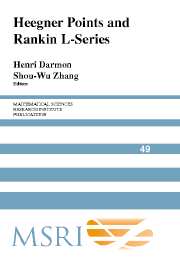Book contents
- Frontmatter
- Contents
- Preface
- Heegner Points: The Beginnings
- Correspondence
- The Gauss Class Number Problem for Imaginary Quadratic Fields
- Heegner Points and Representation Theory
- Gross–Zagier Revisited
- Special Value Formulae for Rankin L-Functions
- Gross-Zagier Formula for GL(2), II
- Special Cycles and Derivatives of Eisenstein Series
- Faltings' Height and the Derivatives of Eisenstein Series
- Elliptic Curves and Analogies Between Number Fields and Function Fields
- Heegner Points and Elliptic Curves of Large Rank over Function Fields
- Periods and Points Attached to Quadratic Algebras
Heegner Points: The Beginnings
Published online by Cambridge University Press: 06 July 2010
- Frontmatter
- Contents
- Preface
- Heegner Points: The Beginnings
- Correspondence
- The Gauss Class Number Problem for Imaginary Quadratic Fields
- Heegner Points and Representation Theory
- Gross–Zagier Revisited
- Special Value Formulae for Rankin L-Functions
- Gross-Zagier Formula for GL(2), II
- Special Cycles and Derivatives of Eisenstein Series
- Faltings' Height and the Derivatives of Eisenstein Series
- Elliptic Curves and Analogies Between Number Fields and Function Fields
- Heegner Points and Elliptic Curves of Large Rank over Function Fields
- Periods and Points Attached to Quadratic Algebras
Summary
Prologue: The Opportune Arrival of Heegner Points
Dick Gross and I were invited to talk about Heegner points from a historical point of view, and we agreed that I should talk first, dealing with the period before they became well known. I felt encouraged to indulge in some personal reminiscence of that period, particularly where I can support it by documentary evidence. I was fortunate enough to be working on the arithmetic of elliptic curves when comparatively little was known, but when new tools were just becoming available, and when forgotten theories such as the theory of automorphic function were being rediscovered. At that time, one could still obtain exciting new results without too much sophisticated apparatus: one was learning exciting new mathematics all the time, but it seemed to be less difficult!
To set the stage for Heegner points, one may compare the state of the theory of elliptic curves over the rationals, E/Q for short, in the 1960's and in the 1970's; Serre has already done this, but never mind! Lest I forget, I should stress that when I say “elliptic curve” I will always mean “elliptic curve defined over the rationals”.
In the 1960's, we were primarily interested in the problem of determining the Mordell-Weil group E(Q), though there was much other interesting apparatus waiting to be investigated (cf Cassels' report). There was a good theory of descent, Selmer and Tate-Shafarevich groups, and so forth: plenty of algebra.
- Type
- Chapter
- Information
- Heegner Points and Rankin L-Series , pp. 1 - 10Publisher: Cambridge University PressPrint publication year: 2004
- 6
- Cited by

